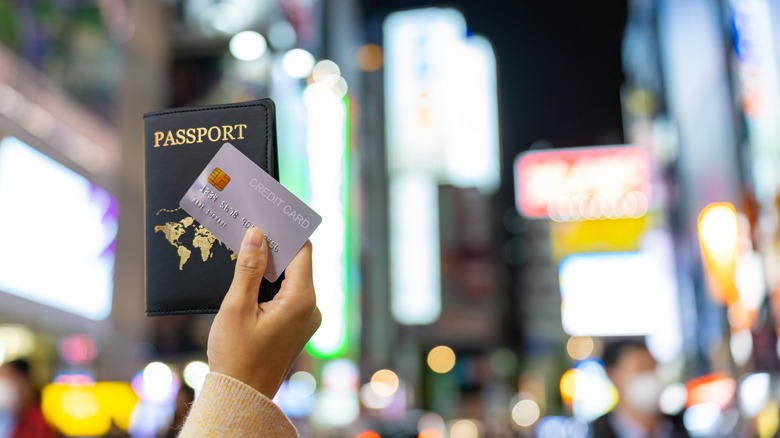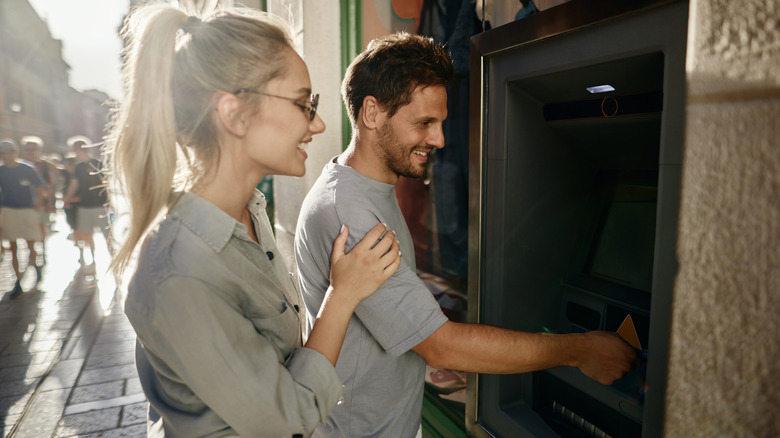The Payment Method Rick Steves Avoids Using While Traveling Abroad
Spending money while traveling is vastly different from spending at home. You might breeze through your local grocery store with a debit card or a tap of your phone (Apple Pay, anyone?), but in a foreign country? Better be on your toes. In addition to figuring out how much cash to have on hand or using every hack in the book to stay on budget, you need to make sure your hard-earned money remains safe. And who better to tell us how than travel guru Rick Steves? His advice: Dump the debit card and stick with your credit card the entirety of the trip, with one tiny exception.
Steves has practically lived half his life on the road, so he knows a thing or two about keeping your money safe while you're out exploring the world. He's got tips on everything from dodging pickpockets in Europe to keeping your cards secure. His top tip is to forego the use of your debit card and rely on your cash and credit cards instead. This way, you get to minimize the chances of having your bank account compromised.
"Because a debit card pulls funds directly from your bank account, potential charges incurred by a thief will stay on your account while your bank investigates," the "Rick Steves' Europe" host wrote on his website. "For that reason, I limit my debit card use to cash-machine withdrawals. To make purchases, I pay with a credit card or cash."
Why credit cards are the safest option for travel
Remember, your debit card is like a direct pipeline to your bank account. If it's linked to your payroll account, every swipe or tap is basically dangling all your hard-earned cash over potential financial doom. "If someone gets a hold of your debit card information, the second they use it, depending on the nature of the transaction, your bank account will be drained," identity theft expert Robert Siciliano shared with CNBC.
Backing him up is Frank Abagnale, the infamous fraud expert and former con artist depicted in "Catch Me if You Can." He told the outlet, "A debit card is certainly and truly the worst financial tool ever given to the American consumer." With a credit card, you're not spending your own money, you're just dealing with a bill later. Plus, you won't have to worry about financial repercussions if it gets compromised. "If there's a large data breach and a criminal does somehow get my credit card number and charges $1 million on it, I'm protected and my credit card company will cancel the card and send a new one within the next couple of days," he added.
And he's right. According to the Federal Trade Commission, if you don't report your debit card lost or stolen within 60 days, you could be on the hook for any charges, including unauthorized ones. If you only realize your debit card was compromised months after your trip, that's money down the drain.
Only use your debit card when withdrawing money
Just because credit cards are generally safer doesn't mean you should abandon your debit card entirely. Rick Steves says it's still wise to keep one around, especially when you need to access cash — and you'll surely need cash at some point in your trip. And while exchange centers are more convenient, they might gouge you with terrible rates. ATMs with a debit card tend to offer better deals.
"Use this [debit card] at ATMs to withdraw a small amount of local cash. Wait until you arrive to get local currency (European airports have plenty of ATMs); if you buy local currency before your trip, you'll pay bad stateside exchange rates," Steves advised on his website. "While most transactions are by card these days, cash can help you out of a jam if your card randomly doesn't work and can be useful to pay for things like tips and local guides."
A word of caution, though: ATMs can be deceptive, so don't rush when withdrawing your money. Always read the screen carefully to avoid getting ripped off. "If an ATM offers to "lock in" or "guarantee" your conversion rate, choose "continue without conversion,'" warned Steves via his blog. "Other prompts might state, 'You can be charged in dollars: Press YES for dollars, NO for euros.' Always choose the local currency."


